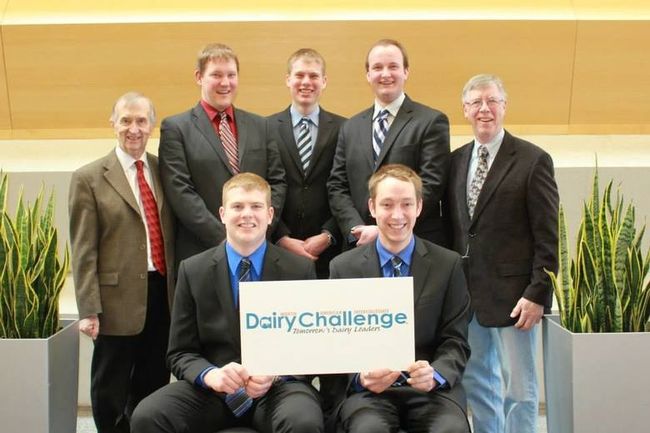
The University of Guelph earned top honours over the weekend at the North American Intercollegiate Dairy Challenge in Fort Wayne, Indiana, US. Back row, left to right, Coach Dr. John Walton, Coach Mark Carson, John Wynands, Peter Spruit, Coach Dr. Ken Leslie. Front row: left to right, Alan Nanne and Hans van Lith from Oxford County.
The University of Guelph earned top honours over the weekend at the North American Intercollegiate Dairy Challenge in Fort Wayne, Indiana, US. The team consisted of their three coaches Dr. John Walton, Mark Carson and Dr. Ken Leslie with students John Wynands, Peter Spruit, Alan Nanne and Hans van Lith. The UofG team beat out rivals from schools including Cornell, Pennsylvania University and California Polytechnic State University, making this win their fourth over the past nine years!
The University of Guelph is one of the only schools to offer a credited course to prepare students for the Dairy Challenge. Throughout the course, the class visits various dairies and learns how to analyze reports from the operation’s management programs, feed analysis, herd health reports, etc in an effort to determine ways the dairy operation can make changes to become more efficient and therefore more profitable. They are then to prepare a presentation based on their findings, the top four students are the ones chosen for the big competition, which this year was held in Fort Wayne.
During the two-day event, teams analysed data about a large farm operation, tour the facility and prepare a detailed presentation on how to improve efficiencies at the operation. The Canadian team faces other challenges as well that most of the other competitors do not. Coming in and analyzing a U.S. dairy without the experience and knowledge of the U.S. Dairy industry can be a hurdle, one of the biggest obstacles being the fact that these dairies are not on a supply management system which the UofG students are used to. The biggest dairy they visited during their course work was a 250 cow dairy , but the dairy they had to analyze for the Big Challenge was 1,000 cows. Although the numbers change and the industry has it’s differences, the principles they’ve learned in the course stays the same. Not letting the size of the challenge overwhelm them, they were able to come out on top!
“We knew we had a pretty good team but we never expected to win because it is a pretty prestigious competition, including all the big dairy skills,” said Hans van Lith humbly Tuesday.
Van Lith and teammates were able to identify several ways the barn could cut costs and produce more milk. They also identified simple layout changes that would help the workload be completed more efficiently.
This year’s win brings University of Guelph’s total to four wins over the past nine years in the esteemed and well-known competition.
Guelph is one of the only schools to offer a credited course to prepare students for the Dairy Challenge.
Van Lith and his team -Peter Spruit, a former Oxford resident now living in Kincardine, John Wynands of Cornwall and Alan Nanne of Packenham had to beat out their classmates in an Ontario version of the competition to earn their spot in the Fort Wayne competition. Van Lith said the class and competition allowed him and his classmates to learn more about the U.S. dairy industry.
“It’s quite different what they do compared to do what we do here in Canada. The biggest farm we visited here in Canada was 250 cows. There the competition was based on a 1,000 dairy herd. There’s not supply management there,” he said.
Van Lith graduates in a few weeks and plans to return home to farm for at least the summer and then decide his next step.









